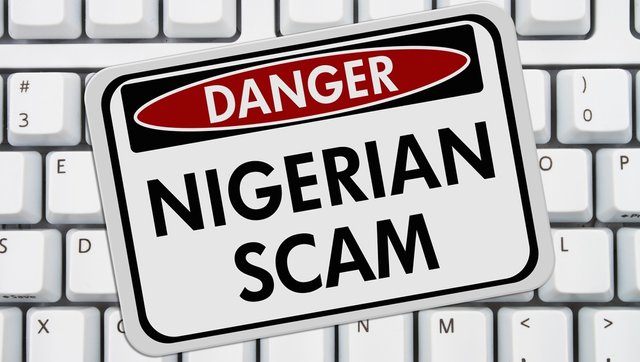Nigerian Scam

One of the cons about being a Nigerian is that the reputation of Nigerian Scammers have presided you to where ever you go. This begs the question, what is Nigerian Scam.
Nigerian Scam also known as 'Nigerian 419' often involves offering you a share in a large sum of money on the condition you help them to transfer it out of their country.
These scams are often known as 'Nigerian 419' scams because the first wave of them came from Nigeria. The '419' part of the name comes from the section of Nigeria’s Criminal Code which outlaws the practice. These scams now come from anywhere in the world.

How it works
There are a lot of ways this scammers operate, they try to get more creative with each attempt so its not easy keeping track of how they are operating currently.
Most times, the scammer will tell you an elaborate fake story about large amounts of money 'trapped' in central banks during civil wars or coups, often in countries currently in the news. They could also tell you about a large inheritance that is 'difficult to access' because of government restrictions or taxes in the country.
They could also pretend to be your lover on the internet, this is a more long term approach (yahoo yahoo) and they would keep having issues with things like rent and health until you decide to sum up how much you have spent on your online partner.
It is called yahoo yahoo, cause this form of scam started with the invention of yahoo mail and most especially the yahoo messenger.
The scammer may contact you by email, letter, text message or social networking message. They will offer you a large sum of money to help them transfer their personal fortune out of the country.
Scammers may ask for your bank account details to 'help them transfer the money' and use this information to later steal your funds.
They may ask you to pay fees, charges or taxes to 'help release or transfer the money out of the country' through your bank. These fees may even start out as quite small amounts. If paid, the scammer may make up new fees that require payment before you can receive your reward. They will keep asking for more money as long as you are willing to part with it.
You will never be sent the money that was promised.

Warning Signs
These are some signs you are about to be swindled.
- You receive a contact out of the blue asking you to 'help' someone from another country transfer money out of their country (e.g. Syria, Sierra Leone or Iraq). Anywhere there has been war in recent time.
- The request includes a long and often sad story about why the money cannot be transferred by the rightful owner.
- You are offered a financial reward for helping them access their 'trapped' funds. The amount of money to be transferred, and the payment that the scammer promises to you if you help, is usually very large.
- The scammer will often ask you to send money via a money transfer service.
- The scammer/ lover keeps having money issues needing your attention, most times when you just get your paycheck.
The most commonly used money transfer services are Money Gram and Western Union.

Protect Yourself
- Never send money or give credit card details, online account details or copies of personal documents to anyone you don’t know or trust and never by email.
- Set a limit to how much you are willing to send to a partner you have not met in person before.
Make it a very very very small limit. No matter how much the person seems to need it, remember the person survived a long time before you met online.
- Avoid any arrangement with a stranger that asks for up-front payment via money order, wire transfer, international funds transfer, pre-loaded card or electronic currency. It is rare to recover money sent this way.
- Do not agree to transfer money for someone else. Money laundering is a criminal offence.
- Seek independent advice from someone you know and trust if in doubt.
- If you think it’s a scam, don't respond — scammers will use a personal touch to play on your emotions to get what they want.
- Remember there are no get-rich-quick schemes: if it sounds too good to be true it probably is.

Have you been scammed?
If you think you have been scammed, there is a 85% chance you are right, if you think you have provided your account details, passport, tax file number, license, Medicare or other personal identification details to a scammer, contact your bank, financial institution, or other relevant agencies immediately.
Just wanted to shed some light on the whole Nigerian Scam thingy. Also want to acknowledge https://www.scamwatch.gov.au. If you think you have been scammed. visit the link you'll be helped.
Photo Credits to moneysavingexpert.com , insights.dice.com , i.ytimg.com, www.tripwire.com, www.gkmtax.com